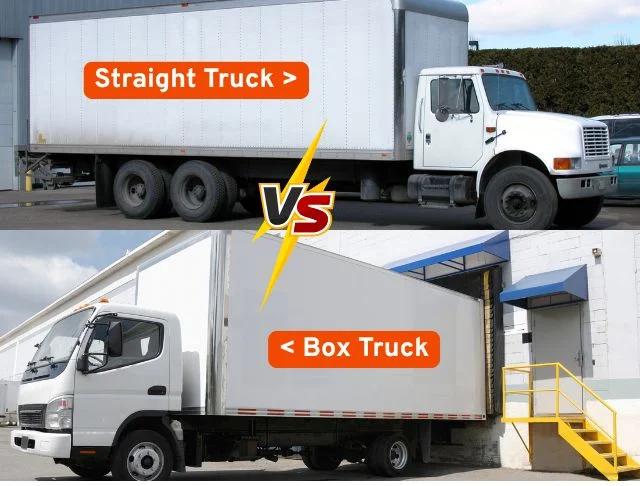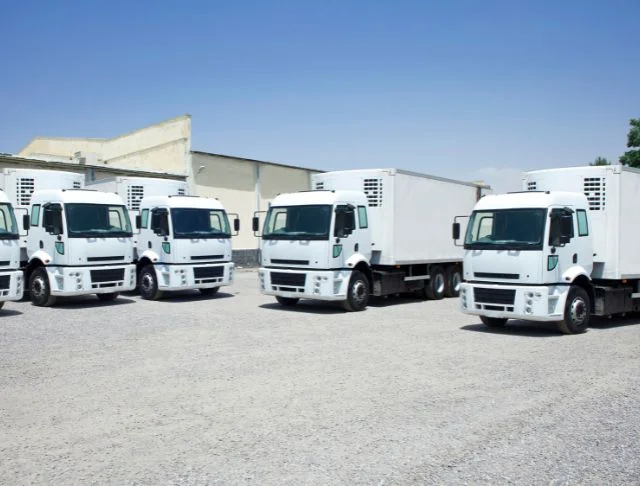by Abdullah Faraz
April 4, 2025
Reviewed by Ford
Truck Dispatch Specialist
Box trucks and straight trucks are two of the most commonly used vehicle types in commercial trucking and transportation. Although people use both terms interchangeably, they have key differences in functionality, cost, and efficiency.
Choosing the right truck is crucial, whether you’re starting a trucking business or need to rent a vehicle for shipping goods.
This guide is for buyers, trucking business starters, shippers, and renters. By the end of this guide, you’ll have a clear understanding of which truck best suits your needs.
Let’s dive in!
Box Truck vs. Straight Truck – What’s the Difference?

When deciding between a box truck and a straight truck, it’s important to understand their structure, common uses, differences in capacity, handling, and costs.
What is a Box Truck?
A box truck is a type of straight truck that features an enclosed cargo area attached to the truck’s chassis. The cargo section is typically a large rectangular “box,” separate from the cab.
It is used for last-mile deliveries, retail and furniture deliveries, and refrigerated deliveries if modified with a cooling system.
Its main benefits are enclosed cargo space, easier to maneuver with no special CDL requirement.
What is a Straight Truck?
A straight truck is a medium- to large-sized truck where the cab and cargo area are part of the same chassis. Unlike a box truck, the cargo area may be enclosed or open, depending on its purpose.
It is commonly used for heavy freight hauling like construction, industrial, appliance, and equipment with regional and midsize deliveries.
Straight trucks have higher payload capacity, are more durable, and are available in various configurations, including flatbeds and refrigerated units.
Key Differences
A straight truck is a broader category that refers to any truck with its cab and cargo area mounted on the same single frame while A box truck is a specific type of straight truck characterized by its enclosed, cuboid-shaped cargo area. This term includes box trucks, dump trucks, moving trucks, and some delivery trucks.
| Feature | Box Truck | Straight Truck |
| Cargo Space & Capacity | Smaller, enclosed, ideal for lightweight goods | Larger payload capacity, handles heavier loads |
| Maneuverability & Handling | Easier to drive, ideal for urban areas | Harder to maneuver, better for highway and regional routes |
| Licensing Requirements | No CDL required under 26,000 lbs GVWR | May require a CDL for heavier models |
| Fuel Efficiency & Costs | More fuel-efficient, lower operational costs | Higher fuel consumption, more maintenance required |
Buying & Operating: Which Truck is Best for Your Business?

If you’re thinking of starting a trucking business, choose the right vehicle type after selecting your core preferences. Because the right vehicle can directly impact your profitability, operational efficiency, and overall success.
Both trucks have different use cases, operational costs, profitability, and legal requirements. So let’s understand them deeply.
Use Cases
Box Truck: Best for Local & Final-Mile Deliveries
Straight Truck: Best for Bulkier & Heavier Loads
Cost Comparison
| Cost Factor | Box Truck | Straight Truck |
| Purchase Price | Lower ($30K – $80K) | Higher ($50K – $120K) |
| Fuel Efficiency | More fuel-efficient, lower fuel costs | Higher fuel consumption due to weight |
| Insurance Costs | Lower | Higher (due to larger size & cargo value) |
| Maintenance Costs | Less expensive, easier repairs | More expensive, requires specialized repairs |
Licensing & CDL Requirements
Box Truck: If the gross vehicle weight rating (GVWR) is under 26,000 lbs, a commercial driver’s license (CDL) is not required.
Straight Truck: If the GVWR exceeds 26,000 lbs, a CDL is required to operate legally.
Profitability & Business Potential
Your truck choice should align with your revenue model.
- Box Truck Business:
- Lower startup costs → Faster break-even
- High demand for local delivery → Steady income
- Lower maintenance costs → Higher long-term profits
- Lower startup costs → Faster break-even
- Straight Truck Business:
- Higher upfront investment → Slower break-even
- Larger loads → Higher potential revenue per trip
- More operating costs → Requires optimized route planning
- Higher upfront investment → Slower break-even
If you’re starting a small business with limited capital, a box truck is a safer investment. However, if you’re expanding into freight hauling or regional logistics, a straight truck offers higher revenue potential.
Renting or Shipping: Which Truck Should You Choose?

If you’re a shipper or renter looking to transport goods, choose a truck based on cargo type, distance, and budget.
Best Truck for Different Cargo Types
A box truck is best for:
- Furniture & Appliances
- Food & Perishables
- E-commerce & Retail Shipments
- Event Equipment & Office Relocations
A straight truck is best for
- Palletized Freight & Bulk Cargo
- Construction & Industrial Equipment
- Long-Distance Regional Freight
- Vehicles or Machinery
Loading & Unloading Differences
Box Truck
Most box trucks have a roll-up rear door and liftgate that make them ideal for small businesses, moving companies, and local deliveries.
They also have a lower deck height that makes it easier to load manually or with a hand truck.
Straight Truck
Some models have side doors or hydraulic lifts to accommodate heavy equipment and palletized goods.
They are forklift-friendly and often designed for the warehouse loading using forklifts.
Rental Costs & Efficiency
If you’re renting a truck, you need to consider cost, fuel efficiency, and how far you’re shipping cargo.
Cost Comparison
| Factor | Box Truck Rental | Straight Truck Rental |
| Daily Rental Price | $75 – $150 per day | $125 – $250 per day |
| Fuel Efficiency | 8-12 MPG (better for city trips) | 6-10 MPG (better for long hauls) |
| Best for | Local deliveries, moving, small cargo | Heavy shipments, long distances |
Short-Haul vs. Long-Haul Shipments
- If you’re moving locally or within the same city, a box truck is less expensive and more fuel-efficient.
- If you’re shipping across multiple regions or carrying large freight, a straight truck is better suited for longer distances and heavier loads.
Final Decision: Which Truck is Right for You?
Choosing between a box truck and a straight truck depends on whether you’re buying, renting, or shipping cargo.
Here’s a quick guide to help you decide:
📌 When to Choose a Box Truck?
✅ If You’re Buying for a Business:
✔ Best for local delivery, moving services, e-commerce, and perishable goods
✔ Lower upfront and maintenance costs
✔ No CDL required for models under 26,000 lbs
✅ If You’re Renting for Shipping:
✔ Ideal for furniture, small freight, or city deliveries
✔ More fuel-efficient for short distances
✔ Easier to drive and park in urban areas
📌 When to Choose a Straight Truck?
✅ If You’re Buying for a Trucking Business:
✔ Best for freight transport, construction materials, and industrial goods
✔ Higher load capacity for regional and long-haul deliveries
✔ More customization options (flatbeds, reefer units, etc.)
✅ If You’re Renting for Shipping:
✔ Ideal for large cargo, heavy loads, and long distances
✔ Can handle palletized freight and oversized shipments
✔ Often equipped with forklift-friendly loading
Next Steps

For Buyers
If you’re planning to start or expand a trucking business, you can buy the right truck from dealerships, online marketplaces like TruckPaper, and fleet auctions. Leasing the truck is also a good option. You can also avail bank loans or contact specialized trucking lenders that offer low down payment options for startups.
You’ll also need a CDL if the truck’s GVWR exceeds 26,000 lbs, and a DOT Number, Insurance, and factoring setup.
For Shippers/Renters
If you’re looking to rent a truck for cargo shipping, follow these tips to save money and book the right truck.
U-Haul, Enterprise, Ryder, Penske: Offer daily rentals for local or long-haul transport.
Freight Brokers & Logistics Companies: Connect you with dedicated trucking services. Truck dispatch companies can also assist with this.
Peer-to-Peer Rentals: Check Fluid Truck or Fetch for cheaper, short-term rentals.
Remember to always book early, choose the right truck size, negotiate rates, and compare insurance plans.
